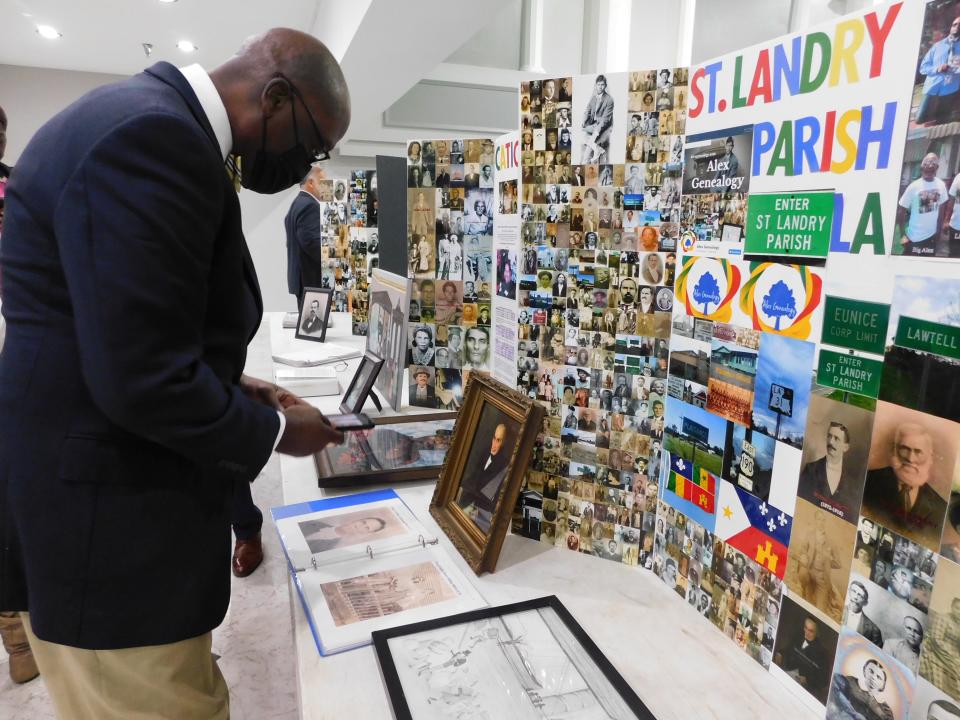St. Landry hopes to make learning about your ancestors easier with digital records
The often complicated and intertwining history involving free people of color and antebellum slavery has stories that are waiting to be told through genealogical records, as the St. Landry Parish Clerk of Court attempts to make familial records more accessible through digitalization.
Descendants of families with ties to St. Landry Parish gathered recently in Opelousas to get a glimpse of what is available for research in the Clerk of Court archives as grant initiatives are underway to make information easier to obtain, said Clerk of Court Charles Jagneaux.
“We held our first seminar on some of the records that we have here in our Courthouse archives to give individuals an introduction for what kind of information they are able to find in our records division. There were nearly 100 people who attended for several hours and what was so encouraging is we had people coming here from different states just to spend one afternoon to get information from the new Clerk of Court archivist Alex Lee,” Jagneaux during an interview.

Jagneaux said the introductory seminar presented by Lee at the Delta Grand, previewed the histories of a number of prominent Black families who helped shape the antebellum history of St. Landry during the past three centuries.
During the 18th and 19th centuries, St. Landry Parish became one of the largest population centers along the Gulf Coast for Black people and free people of color, Jagneaux said.
“From the research we have done through the state and in our own archives with the information available, the only area close to St. Landry in the number of Blacks and free people of color was the Mobile region,” said Jagneaux.
Jagneaux said that the Black population in St. Landry Parish indicates a diverse area influenced by French, Spanish and English-speaking residents, according to records that are available.
“Many of these records in what is now (St. Landry) date back as far as the 1740’s or 1750’s and they are located now in the state archives in Baton Rouge. We are trying to get funding through grants to take the records now in possession of the state and go in and digitalize those records so people can perform research and locate their ancestors who once lived in the parish,” said Jagneaux.
Lake Charles resident Norman Gobert, who previously lived in St. Landry, said the digitalization effort if successful through grant funding will be expanded to assist the Opelousas Museum and the parish Office of Tourism in obtaining information.
“The ultimate goal is to obtain information about the Creole families and free people of color. What we are seeing is that St. Landry resembles New Orleans with regard to the large population for free people of color. A lot of stories about these families can be found in records here in the Courthouse through legal transactions,” said Gobert.
Gobert said large grants are available for the digitalization effort through the National Parks Service and the National Archives. Smaller funding Gobert said, could be obtained through the Louisiana Department of Tourism.
Lee, a resident of Beaumont, Texas, whose ancestors lived in St. Landry Parish, was hired by the Clerk of Court earlier this year as the parish archivist.
His interest in genealogical research began Lee said, began when he started to investigate the story of his own family after listening to oral histories from his maternal grandfather.
“The presentation that we had (at the Delta Grand) is the first of several that are designed mainly to be informative and indicate what is available for them. What we are trying to do is become a research source for families who want to better document their histories,” Lee said.
Lee said the Delta Grand seminar also allowed individuals in attendance who perhaps didn’t previously realize they might be related, to exchange information during informal dialogues.
“We had people who found out they might have cousins in common after they began to talk about their families and share information. I think what many of the people realized is there is a lot of information (in Opelousas) and the parish that is available in our archives,” Lee said.
During his presentation, Lee noted that many of the Black families that continue to populate St. Landry Parish came from slave owners who at some point legally liberated their slaves.
“What has been amazing to me and what the records in our archives show is how families were formed and got together. You have children that were born in slavery and we see that later they were taken care of by their owners and freed. Then those freed children were able to free other family members who had once been enslaved,” Lee said.
Lee pointed out that many free people of color in St. Landry owned their own slaves and accumulated vast tracts of land before the start of the Civil War.
Recently Lee said he has become interested in how former slaves, who emigrated during the early 19th century from Haiti, have influenced the current ancestry in St. Landry.
“I have started getting information from the Haitian colonial archives and with those records and the French archives that have now become available, I am starting to collect information. Many of the descendants from those who left Haiti during the uprisings against the French are sitting here today,” Lee told his audience.
This article originally appeared on Opelousas Daily World: St. Landry hopes to make genealogy research easier with digital records

